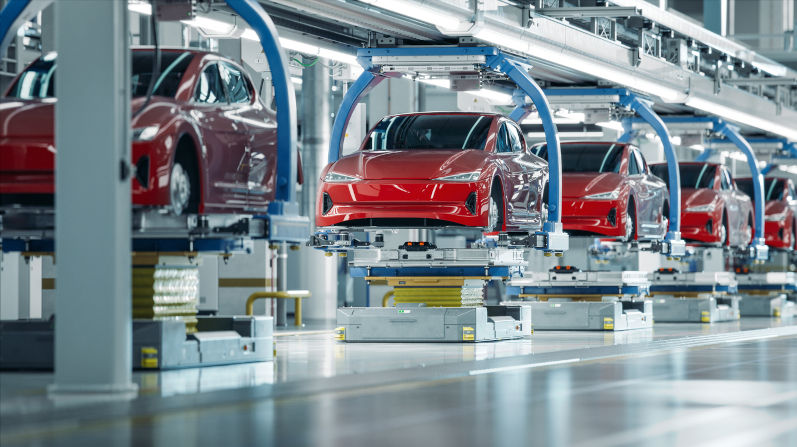We killed our car industry and now we're drafted to fight against Chinese EVs (again?)
October 3, 2025
The call is getting louder and louder: Australia needs to join allies in restricting Chinese electric vehicles.
But what are their crimes?
They’re… affordable.
Too affordable, maybe.
On paper, the story is tidy: Beijing props up its EV industry with subsidies, cheap Chinese cars pour into foreign markets. And we, Australia, so the script goes, must raise the tariff barricades to defend “fair competition” and relevant industries.
But let’s stop there.
Defend what, exactly?
The truth is our car industry is a museum piece. The last local factory shut its doors in 2017. Holden, Ford, Toyota, all gone.
For decades, Australians have shelled out for the cast-offs of Europe, Japan and the US: oil-thirsty, outdated models sold at inflated prices (plus months of waiting).
That context, however, gets conveniently erased.
Against this backdrop, Chinese EVs arriving at reasonable prices look less like a “threat” and more like a long-delayed market correction. For households, it feels like consumer rights finally restored.
And these are not the “cheap and nasty” knock-offs critics imagine.
Anyone who’s actually sat in a Chinese EV knows better, that from industrial design to smart cockpits, from battery systems to user experience, China has built a layered edge.
Even Ford’s chief executive Jim Farley, hardly someone with an incentive to praise the competition, calls China’s EV dominance “the most humbling thing I have ever seen”.
He points out that Chinese manufacturers have “far superior in-vehicle technology” where “you get in, you don’t have to pair your phone. Automatically, your whole digital life is mirrored in the car”. The cost and quality, he admits, “is far superior to what I see in the West”.
Farley spent six months behind the wheel of a Xiaomi SU7 — yes, the car from a company better known for smartphones — and came away reluctant to hand over the keys.
That hardly fits the story of cheap, second-rate imports. What it shows is that the benchmark has shifted, and Western makers are scrambling to keep up. Which is why all the talk of “oversupply” rings hollow: it’s less about helping buyers than about cushioning the ones still stuck in yesterday’s race.
Are Chinese EVs perfect? No. But their reliability, efficiency, innovation — and above all affordability — fill a yawning gap in Australia’s market. They bring life into a sector that’s been stagnant for years.
Calling that a “threat” turns logic upside down: affordable, well-made cars become a problem. And in the name of “allied solidarity”, Australian families are told to settle for fewer choices and higher bills.
Why don’t we just look around?
Washington’s subsidies protect Detroit. Brussels’ tariffs shield Volkswagen and Renault. Tokyo has been running industrial policy for years. These are moves to guard their home turf.
But, seriously, if Australia copies them, what are we protecting? An industry that doesn’t exist? The right to keep overpaying?
All we’d be doing is stripping our own consumers of access to the world’s best tech at the best prices. And the irony cuts deeper: this retreat into protectionism lands just as Australia has pledged to a higher climate ambition.
Block affordable EVs now, and watch emissions targets turn into hollow slogans, how clever. We’ll have pledged to save the planet while making sure nobody can afford the cars that might actually help. Brilliant.
And the chorus about “illegal subsidies”?
The US Inflation Reduction Act throws hundreds of billions at clean energy. The EU’s Green Deal does the same. So why is China singled out?
Apparently the crime isn’t subsidising – it’s subsidising successfully. God forbid someone actually deliver results.
They delivered success in EV production, cracked the battery-cost barrier, and built decent cars.
If you believe in markets, you let competition in. You don’t smother it behind tariff walls. Protectionism won’t sharpen carmakers. It dulls them. It punishes consumers by stripping away choice. And in Australia, the hit lands hardest, because we have nothing to protect.
Australia’s interests don’t lie in playing pawn to someone else’s rivalry. They lie in lowering household costs, expanding clean transport, hitting emissions targets with credibility and widening consumer choice.
If Chinese EVs force Tesla to cut prices and raise quality, good. If they push Europe’s carmakers to speed up innovation, better still.
The real coercion isn’t coming from Beijing. It’s the demand, dressed up as loyalty, that Australians pay more for worse cars just to play a walk-on role in a great-power drama.
We don’t need that kind of loyalty test. The real test is whether policymakers can deliver what matters: cheaper living costs, faster cleantech adoption, stronger climate action, more choice.
If you want solidarity, let it be with mortgage-stretched families, with young Australians staring down climate fallout, with the principle that green mobility shouldn’t be a rich-only privilege.
The question is as simple as it has always been: why should Australians pay more, fall further behind on climate, accept fewer choices, just to prove loyalty in somebody else’s contest, and at the end of the day, still get outdated cars with months of waiting period?
And when petrol climbs back to $2 a litre, will those demanding our loyalty spare even a cent for the families footing the bill?
The views expressed in this article may or may not reflect those of Pearls and Irritations.

